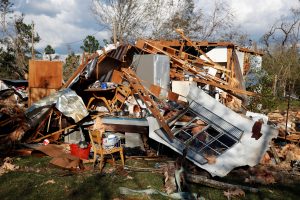
By Terray Sylvester
FOUNTAIN, Fla. (Reuters) – Bernard Sutton, a 64-year-old cancer patient, and two buddies have been living out of a camping tent and broken-down minivan since his double-wide trailer home in rural Fountain, Florida, was torn apart by Hurricane Michael last week.
On Monday, five days after the storm plowed into Florida’s Gulf Coast, Sutton was standing over a heap of clothes, books, furniture and other belongings he had salvaged from the wreckage.
“I’m staying out here to try to keep away looters, to try to save what I can save,” he said. “This is everything we own right here.”
With his wife having moved in with a sister for the time being, Sutton said he had no means of transportation even if he was willing to leave. He had been working on the minivan’s motor when the storm hit and ended up taking cover from the hurricane on the ground underneath his shattered trailer.
Sutton, who worries about how he will make it to his next round of chemotherapy, is one of countless hurricane survivors in the backcountry of Florida’s Panhandle who have struggled for days without power, running water or sanitation as they await help from authorities.
While the attention of emergency officials, the media and even President Donald Trump has been focused on the devastated beachfront towns hardest hit by the storm, residents in battered communities farther inland said they were making do until disaster relief was able to reach them.

A home destroyed by Hurricane Michael is pictured in Fountain, Florida, U.S., October 15, 2018. REUTERS/Terray Sylvester
“Everyone needs help. We’re devastated out here. We’re wiped off the map,” said Gabriel Schaw, 40, gesturing to a handful of neighbors surrounding his own demolished mobile home in Fountain, an unincorporated Bay County community off U.S. Highway 231 northeast of Panama City.
Schaw said the first sign of outside help he had seen was some firefighters conducting checks nearby on Monday morning.
At least 85 percent of customers in four other mainly rural Panhandle counties – Calhoun, Franklin, Liberty and Gulf – remained without electricity on Monday, state officials said.
Schaw was camping out on his mattress in what remained of his trailer’s living room, now exposed to the elements with an exterior wall and part of the ceiling ripped open. With no power, he was unable to pump fresh water from his well.
Joy Aguilar, 27, a mother of two, said she was bathing her children in a nearby creek.
‘NEED WATER?’
A couple of miles away, Sutton and his roommates at least had access to drinking water thanks to a neighbor, Brian McCormick, 61, who had hooked up a generator to his own well.
“I’m just trying to do my part to help my neighbors,” said McCormick, sitting under a plastic awning beside two makeshift plywood signs near his gate. One read, “Need water?” The other instructed, “Bring containers. Ring Bell.”
Motorized access around the Panhandle has been obstructed by numerous fallen pine and oak trees that have been uprooted or snapped in half, with many of them strewn over two-lane highways and dirt roads that snake through the region.
“It’s slow-going for rescuers, and generally, if rescuers can’t get in, those people also can’t get out,” said Matthew Marchetti, co-founder of the volunteer search-and-rescue organization CrowdSource Rescue, which has several hundred members on the ground in Florida.
Widespread telephone outages left many residents cut off from relatives, prompting a flood of missing-persons reports since the storm hit.
CrowdSource Rescue teams were still trying to locate about 1,000 people who have been reported unaccounted for by family members, down from about 2,100 on Friday, Marchetti said. Official figures were unavailable.
CrowdSource was conducting the bulk of its checks around Panama City, near where Michael made landfall.
One was for a 78-year-old grandmother found on Monday outside the wreckage of the house where she lived alone with her two small dogs.
Russ Montgomery Jr., a CrowdSource volunteer from San Antonio, Texas, said the woman, whose name was withheld for privacy reasons, was down to her last bottle of water and surviving on fruit from her persimmon trees.
Montgomery said he had offered to drive the woman anywhere she wanted to go, but she insisted on staying put to ward off possible looters.
“She looked me right in the eye and said, ‘I’ve got a baseball bat and I know how to use it, and nobody’s coming into my house and taking my stuff,’” Montgomery recounted. He said he left her food and water, posed with her for a selfie, gave her a hug, and moved on.
(Reporting by Terray Sylvester in Fountain, Florida; Additional reporting and writing by Steve Gorman in Los Angeles; Editing by Bill Tarrant and Bernadette Baum)
